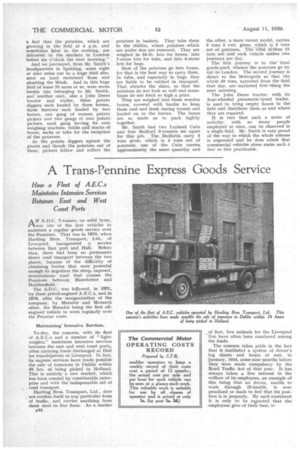A Trans-Pennine Express Goods Service
Page 34

If you've noticed an error in this article please click here to report it so we can fix it.
How a Fleet of A.E.C.s Maintains Intensive Services Between East and West Coast Ports
AN A.D.C. 7-tonner, on solid tyres, was one of the first vehicles to maintain a regular goods service over the Pennines. That was in 1930, when Harding Bros. Transport, Ltd., of Liverpool, inaugurated a service between that port and Hull. Before then, there had been no permanent direct road transport between the two places, because of the difficulty of obtaining lorries that were powerful enough to negotiate the steep, exposed, mountainous road that crosses the Pennines between Manchester and Huddersfield.
The A.D.C. was followed, in 1931, by three petrol-ertgined A.E.C.s, and in 1934, after the reorganization of the company, by Matador and Monarch oilers, the Matador being the first oilengined vehicle to work regularly over the Pennine route.
Maintaining' Intensive Services.
To-day, the concern, with its fleet of A.E.C.s and a, number of " lightweights," maintains intensive services between the cast and west coast ports, often carrying loads discharged at Hull for transhipment at Liverpool. In fact, its express services have made possible the sale of tomatoes in Dublin within 48 his, of being picked in Holland. This is entirely a new market, which has been created by considerable enterprise and with the indispensable aid of road transport.
Harding Bros. Transport, Ltd., does not confine itself to any particular form of traffic, and carries anything from sheet steel to live lions. As a matter 432 of fact, live animals for the Liverpool 'Zoo have often been numbered among the loads.
The concern takes pride in the fact that it instituted a system of driver's log sheets and hours of rest, in January, 1934, some nine months before they were made compulsory by the Road Traffic Act of that year. It has always taken a live interest in the welfare of its employees, an example of this being that no driver, unable to work through ill-health, is ever penalized or made to feel that his position is in jeopardy. By such treatment it is only to be expected that the employees give' of their best. ni












































































